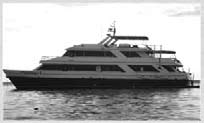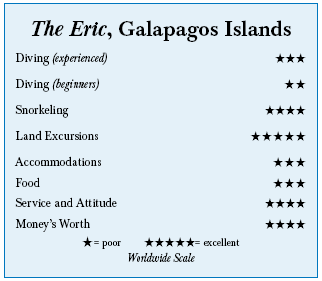The Eric, Galapagos Islands, EcuadorContents of this Issue: Small Hope Bay Lodge, Andros Island It’s Sea Lice Season in the Caribbean Again Oceanic Wilderness: Mysteries of the Silent Deep The Eric, Galapagos Islands, Ecuador Aquatic Encounters Is Taking a Sabbatical Get Published in the 2009 Chapbook! Dealing with “Difficult” Divers When Considering Deep Stops, Profiles Rule Help Keep Hawaiian Fish Out of Aquariums Oh, Did We Mention the Fuel Surcharge? Thumbs Down: Scuba Coiba and Coiba National Park, Panama Editorial Office: Ben Davison Publisher and Editor Undercurrent 3020 Bridgeway, Suite 102 Sausalito, CA 94965 the “dive lite” version with energetic surface intervals from the April, 2008 issue of Undercurrent
Dear Fellow Diver: Whenever you hear about Galapagos diving, the discussion always focuses on Wolf and Darwin Islands, home to hammerheads, mantas, whale sharks and other big critters. These rocky outcrops at the northern end of the archipelago are only visited by dedicated dive boats, which are restricted by Galapagos National Park (GNP) regulations to just a few land excursions – for now. Per our article in the October 2007 issue of Undercurrent, the GNP temporarily suspended all dive boat operations, then required the boats to apply for new permits, so the situation is always changing. I toured the islands in January with a group that was more into boobies and tortoises than sharks and rays, so I found myself on a liveaboard that offered the usual range of land excursions and snorkeling, plus an optional package of four dives during the seven-day cruise. The Eric is one of three identical 20-passenger motor yachts operated by a local company, Ecoventura. The boats specialize in “active departures,” that include longer hikes, daily snorkeling and optional kayaking and diving. They’re best for divers who want more vigorous surface intervals in their itinerary. To boost the local economy, diving is conducted by shore-based operators, so it is restricted to islands with towns that support dive shops. My original itinerary called for me to dive different sides of Santa Cruz Island on Tuesday and again on Friday. Runway repairs caused my plane to fly to a military air base on the island of Baltra rather than the commercial airport on San Cristobal. As a result of that switcheroo, my diving was rescheduled for Thursday and Saturday. The lesson is clear: When planning a Galapagos trip, flexibility is key, because conditions or GNP regulations can change at any time. After boarding, unpacking and a buffet lunch, the Eric motored to nearby Isla Mosquera for snorkeling. I suited up on the fantail, then climbed down a ladder to a swim step where the crew helped divers into two inflatable pangas. Splitting the group in two minimized our impact on the environment – and each other. Nearing the beach, I was introduced to the unique fauna of the islands: sea lions and marine iguanas paddled around the panga, bright orange Sally Lightfoot crabs decorated the rocks like Christmas ornaments, and frigate birds, yellow-crowned night herons, and blue-footed boobies circled overhead. While admiring the view, my guide Karina described several endemic animals, birds and plants that had inspired Charles Darwin’s theories of evolution in his book Origin of The Species.
In the water, I saw plenty of sea lions but was disappointed in not spotting marine iguanas beneath the surface. Later snorkeling trips featured tiny Galapagos penguins (although I didn’t see any underwater), and semi-tropical fish such as Moorish idols, brilliant king angels, several species of parrotfish and giant damselfish with c-shaped tails. While snorkeling through a crevice between two rocks at Darwin Bay on Genovesa, I almost ran into a five-foot, white-tip reef shark coming straight at me. I threw up my hands to brake my forward progress while he executed a nifty flip turn and split. I’m not sure who was more startled.
A Massachusetts couple joined me for diving on Thursday. We were met at 8 a.m. by Rafael Gallardo, divemaster from the SubAqua dive center. He and a deckhand helped us aboard a six-pack dive boat where we met two other divers from one of our sister ships. The covered SubAqua boat included a head and plenty of dry storage in the cabin. On the way to the island of Santa Fe, forty minutes southwest of Puerto Ayora, I unpacked my gear. My nearly new XS Scuba 6-mil wetsuits fit much better than the tatty, 3-mil snorkeling suits supplied by the Eric. I had brought my own regulator and console, but the others were issued Scubapro regs and pressure gauges, but no computers. Crew set up the regs and less-than-new Scubapro Pilot BCDs on aluminum 80 tanks, then helped us into them. After a brief, shallow check-out, I proceeded to a site called the Caves, where a friendly sea lion guided me through a low-ceilinged swim-through and steered around a stingray in the sand. I emerged into a strong current so I turned sideways to slow my drift. In the 40- foot visibility, I saw three eagle rays but no fish I hadn’t already seen snorkeling. Water temperature dropped to 64 degrees as I descended through a combination halocline/thermocline at 52 feet, so I appreciated the hood and boots SubAqua had provided me. After the dive I handed up my weights, fins, and tanks, then climbed a short, open-sided ladder into the stern. During the surface interval, Rafael handed out dry towels and set out a tray of cold cuts, hot dog buns and Oreos, plus water and soft drinks. By noon, I was back in the water on the other side of Santa Fe. Visibility here was closer to 90 feet. Two playful sea lions hung with us for half the dive, and I also spied blue chin parrots, white spotted sand bass and harlequin wrasse so brightly colored they looked like giant koi. The terrain was primarily lava rock. Vegetation was not particularly colorful, and the small stands of coral I saw were all bleached so the fish were the exotic attractions. Rafael had us back on the Eric by 1:30, so I joined the afternoon excursion to Puerto Ayora and the Darwin Center where giant tortoises and land iguanas basked in the sun. Each morning, the intercom in my room played gentle wake-up music at 6:45 a.m. A buffet breakfast served from 7 to 8 a.m. was hearty, bland and high in carbs. Tasteless omelets, fried eggs congealing in a steam table compartment, and lukewarm coffee prevailed. There was plenty of fresh fruit, a different variety of exotic juices, and do-it-yourself raisin toast. At lunch and dinner, we were served delicious soups, then went to the buffet line for salads, entrees and desserts. There was something fried at every meal, often in empanadas. Each time I returned from snorkeling or a shore excursion, I was served fresh juice or water, and snacks such as cheese puffs or Oreos. The one vegetarian aboard seemed happy with her special dishes. Booths seated four to six, but one nice touch was being invited to dine at the Captain’s table. Each night, the affable Captain Peter regaled everyone with stories of his days in the Ecuadorian Coast Guard and treated us to Chilean wine. Before dinner, people gathered in the main salon to read, watch natural history presentations on a LCD TV, or enjoy drinks from the no-host bar and complimentary hors d’oeuvres. On our last night, Captain Peter and crew presented us with maps showing our itinerary for the week and certificates authenticating our adventure. Karina showed photos she had taken of our group throughout the week, then gave each of us a complimentary CD of the slide show – an extraordinary gesture, in my liveaboard experience. My new dive buddies and I discussed the wisdom of diving on Saturday when our flight out was due to leave at 10:30 the following morning. We had been promised a trip with a different dive operator to Kicker Rock off San Cristobal, considered the primo site in the Central Islands, with a chance to see hammerheads and Galapagos sharks. Eventually we decided to scratch the dive and join our shipmates to go souvenir-shopping in Puerto Bacouerizo Moreno. At the airport the next day, someone who made the dive told me that instead of hammers, they encountered ripping currents and an upsurge that took one couple 60 feet to the surface. Looks like our decision was the right one after all. The Galapagos exceeded expectations in every way, except for the diving. The optional dive package ran $360 for four dives. Expensive, but we were treated to true valet service on a very comfortable boat. However, with such good snorkeling and land excursions, next time I’d pack only my mask and snorkel, and leave the diving to the dedicated dive boats. -- D.L.
|

I want to get all the stories! Tell me how I can become an Undercurrent Online Member and get online access to all the articles of Undercurrent as well as thousands of first hand reports on dive operations world-wide
| Home | Online Members Area | My Account |
Login
|
Join
|
| Travel Index |
Dive Resort & Liveaboard Reviews
|
Featured Reports
|
Recent
Issues
|
Back Issues
|
|
Dive Gear
Index
|
Health/Safety Index
|
Environment & Misc.
Index
|
Seasonal Planner
|
Blogs
|
Free Articles
|
Book Picks
|
News
|
|
Special Offers
|
RSS
|
FAQ
|
About Us
|
Contact Us
|
Links
|
3020 Bridgeway, Ste 102, Sausalito, Ca 94965
All rights reserved.


 My upper-level room was just big
enough for a double bed, chest with
one drawer, and built-in nightstand
with another small drawer. Electrical
outlets were 110VAC. I hung clothing
in a half closet and the rest on hooks
behind the door and on various walls.
Two bags could fit on a shelf over
the bed. The full bathroom had a stall
shower and one shelf for toiletries;
the sink had no hot water and my toilet
flushed successfully about one in
four tries. Cabins were air-conditioned
but on the first night’s crossing to
Genovesa, my A/C cut off when the
boat finally anchored. From then on,
I slept better with my large picture
windows open and A/C off. Rooms on
the lower decks had smaller windows or
portholes, and passengers had to put
up with engine noise. Seas were calm,
and our passages were very smooth. No
one had even the slightest queasiness throughout the voyage.
My upper-level room was just big
enough for a double bed, chest with
one drawer, and built-in nightstand
with another small drawer. Electrical
outlets were 110VAC. I hung clothing
in a half closet and the rest on hooks
behind the door and on various walls.
Two bags could fit on a shelf over
the bed. The full bathroom had a stall
shower and one shelf for toiletries;
the sink had no hot water and my toilet
flushed successfully about one in
four tries. Cabins were air-conditioned
but on the first night’s crossing to
Genovesa, my A/C cut off when the
boat finally anchored. From then on,
I slept better with my large picture
windows open and A/C off. Rooms on
the lower decks had smaller windows or
portholes, and passengers had to put
up with engine noise. Seas were calm,
and our passages were very smooth. No
one had even the slightest queasiness throughout the voyage.  Diver’s Compass: American Airlines serves Quito from Miami and
Continental flies in from Houston; recent flights were $560 from
Miami and $825 from Houston . . . My double room on the Eric’s
highest deck, with two picture windows, ran $3,250 per person for
a seven-night cruise; less expensive rooms are available on the
two lower decks . . . Daytime air temperatures were in the mid-
80’s. . . I booked my Galapagos trip with dive travel agency Reef
& Rainforest (800-794-9767;
Diver’s Compass: American Airlines serves Quito from Miami and
Continental flies in from Houston; recent flights were $560 from
Miami and $825 from Houston . . . My double room on the Eric’s
highest deck, with two picture windows, ran $3,250 per person for
a seven-night cruise; less expensive rooms are available on the
two lower decks . . . Daytime air temperatures were in the mid-
80’s. . . I booked my Galapagos trip with dive travel agency Reef
& Rainforest (800-794-9767; 